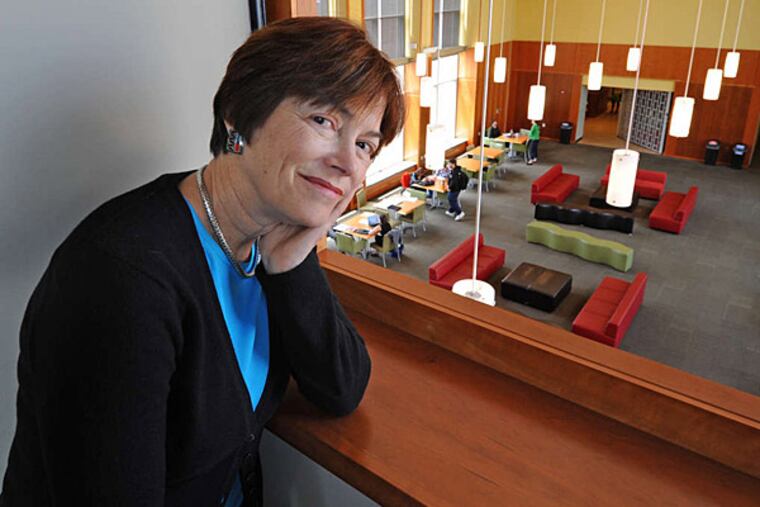Rutgers pioneer in public-interest law looks back
As a female student in the male-dominated law school culture of the early 1970s, Eve Biskind Klothen had such a terrible time that she figured she would leave, go into public-interest law, and never return to academia.

As a female student in the male-dominated law school culture of the early 1970s, Eve Biskind Klothen had such a terrible time that she figured she would leave, go into public-interest law, and never return to academia.
She could not have expected that she would join Rutgers School of Law-Camden, she says, serving as assistant dean for pro bono and public-interest programs. Klothen, 62, will retire in June after 11 years overseeing a pro bono program that has expanded and become, colleagues say, an expected and important part of students' experience.
"She changed the culture here," says Jill Friedman, director of the pro bono and public interest program and Klothen's successor. "She created a culture that cares about pro bono and public service. She's transmitted those values to a generation of law students who now think this way. We greet [students] at the door and we say: 'Get ready. Roll up your sleeves. Welcome to Camden; there's a lot that needs to be done.' "
That sort of expectation did not exist when Klothen joined the school in 2002, she said. Her predecessor had started the school's first in-house pro bono projects, including a project to help individuals file for Chapter 7 bankruptcy.
In her years at the school, Klothen expanded the number of in-house pro bono projects to 14, added external projects with groups such as South Jersey Legal Services, and placed students in public-interest fellowships. Pro bono projects include helping victims of domestic violence obtain restraining orders, helping federal prisoners with civil legal issues as they reenter society, and guiding clients on end-of-life preparation of wills and advance directives.
Law schools have always had clinics where, with supervision and for academic credit, third-year students take on public-service cases from start to finish.
And pro bono service has long been part of the legal profession; the American Bar Association recommends 50 hours of pro bono work a year, and many law firms have their own requirements.
But the idea of pro bono programs for first- and second-year law students is less institutionalized. The four projects that were created before Klothen took over were given little respect, said Meredith Schalick, a Class of 1998 alumna who is now a clinical associate professor at the school and director of its child and family advocacy clinic.
Pro bono projects are simpler than clinics, open to students from their first year. Some are affiliated with clinics, such as the immigration project that provides information and legal referrals, often sending clients to the immigrant justice clinic. But others stand alone, including the pro bono research project, in which public-interest, government, and private lawyers handling pro bono cases request law students' help with legal research.
Simpler does not mean unimportant, Klothen says. She says her biggest obstacle has been convincing faculty that pro bono programs are not only beneficial to students but should be an integral part of legal education.
Matan Shmuel, a 26-year-old student from Cherry Hill, said helping community groups file for 501(c)(3) nonprofit status helped him choose a career path and provided a boost to his resumé. After helping start the 501(c)(3) project last year, Shmuel is preparing to graduate and join a tax firm.
"I'm outside of a classroom, and I'm doing practical stuff. . . . We thought it was a great opportunity to help people empower themselves in Camden. I think that was Dean Klothen's vision," Shmuel said. "My hope was a chance to try out the kind of law I wanted to try. And she said, 'OK, I'll let you do that because it will help Camden.' "
The chance to help people in Camden was a prime attraction of the job, Klothen says. Always interested in public service, Klothen served as a federal agency fraud litigator in Washington and was the founding director of the Philadelphia Volunteer for the Indigent Program.
Lawyers are provided in criminal cases for those who cannot afford them, a constitutional right that is not duplicated for civil cases. In Camden, the nation's poorest city, about 40 percent of adults lack a high school diploma. Defendants in civil cases often cannot afford legal counsel, Klothen says, which leaves a desperate need for pro bono help.
As she sits in her office in the east building of the law school, passion fills her voice as she shifts slightly in her seat, describing the school's duty to the city it calls home.
"A lot is at stake in those civil cases - you can be thrown out of your home, you can lose your child, you can lose your job. There are all kinds of really critical things that get litigated in civil actions, and if you can't afford counsel, sadly, that's too bad," Klothen says. "There is no meaningful access to justice without access to counsel, and because lawyers have a monopoly on the courthouse, they really hold the keys."